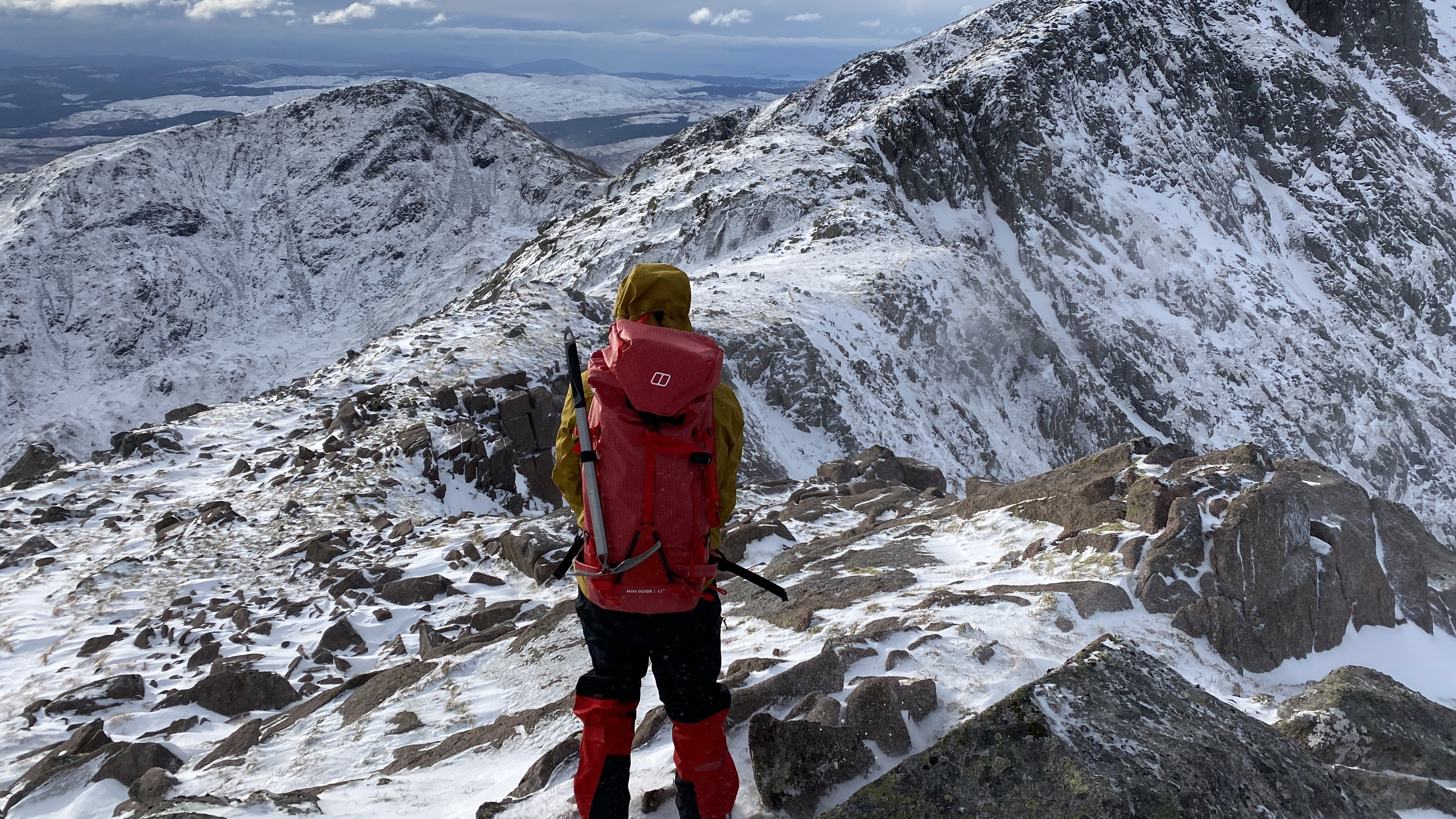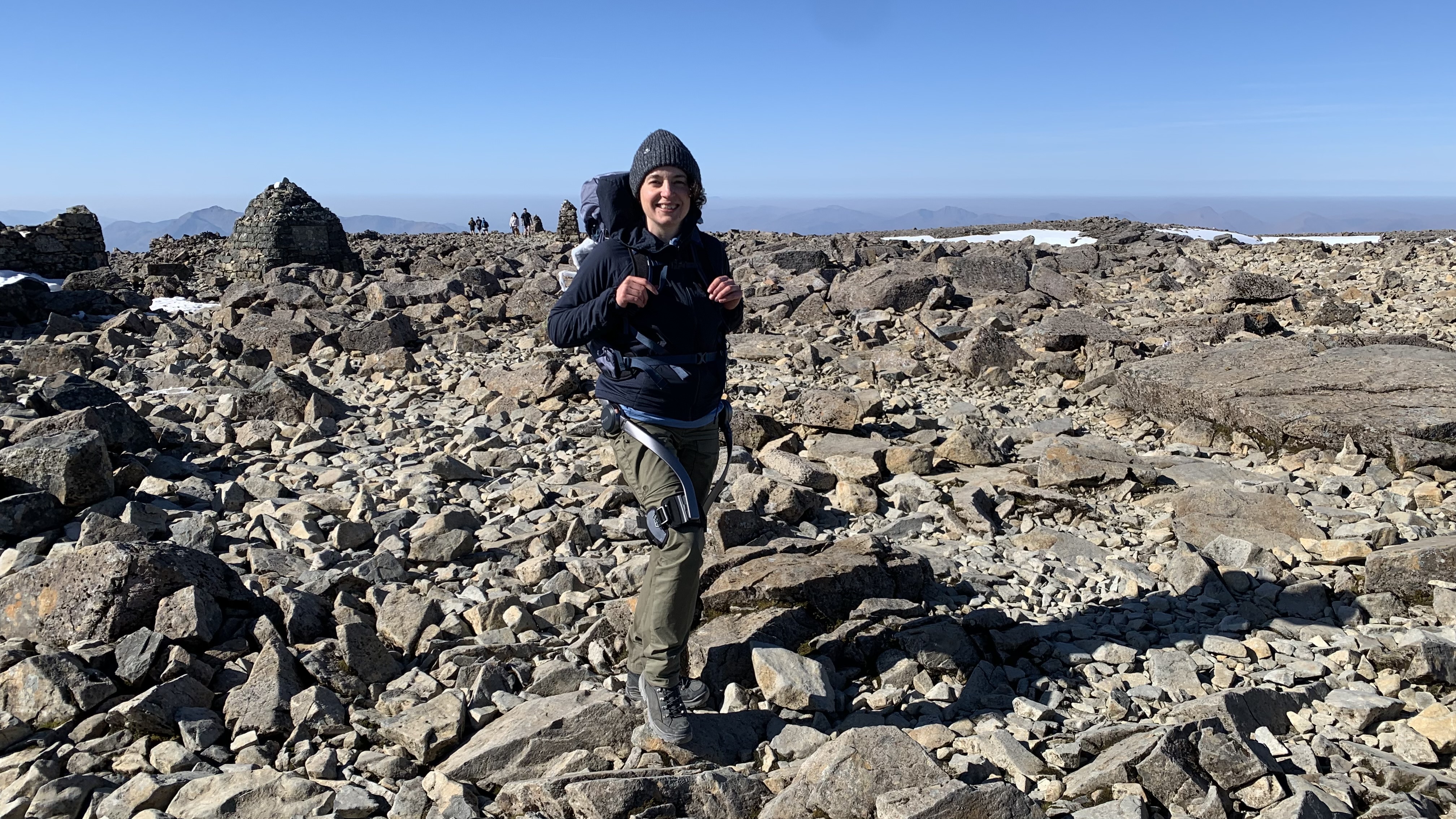Advnture Verdict
A quality pack with customizable features suited to mountaineering, ski touring and climbing use. The fact that it can be stripped back to save on weight is a nice touch, while the build quality and materials mean it should last for countless adventures. Being part of the ‘Guide’ pillar of Berghaus’ Extrem range, it’s aimed squarely at serious mountaineers, so it lacks some of the features more casual hikers might value, like easily accessible mesh pockets, a vented back system and hipbelt pockets.
Pros
- +
Top quality, durable components
- +
Thoughtful attachments for rope, ice axe, poles and helmets
- +
Recycled materials
- +
Highly durable
- +
Customizable for different scenarios
Cons
- -
Feature set aimed at mountaineers, not hikers
- -
Pricier than most
- -
Hipbelt not the easiest to adjust on the fly
You can trust Advnture
The Guide pillar of Berghaus' high end Extrem range is aimed at mountain professionals and alpinists, with kit that performs in the extremes found in the winter and high mountain environment. This year, I was delighted to try out some of the key products in the range, including this excellent mountaineering backpack: the MTN Guide 45+.
Meet the reviewer

Alex is a qualified Mountain Leader and a member of the London Mountaineering Club's committee. He's happiest in the high places, whether he's climbing, hiking or trail running, though he has a particular soft spot for winter mountaineering and enjoys pitting himself, and his kit, against interesting lines in gnarly conditions.
First impressions
RRP: £220 (UK) / no US price currently
Volume: 45+L
Weight: 1.67 kg / 3lb 6.8oz
Sizes: One size (adjustable back length)
Fabric: 100% recycled 400D nylon, with a 600D dope-dyed polyester ripstop
Whichever of the two color options you choose, the Guide 45+ is striking. The Goji Berry red is bright, vivid and undoubtedly makes spotting the wearer on a snowy mountainside all the easier. Whereas the other option, Vaporous Grey looks positively anaemic, like all the blood has been drained out of it.
The main fabric, made from 100% recycled 400 denier nylon with a dope-dyed polyester ripstop, feels tough as old boots and is crinkly to touch. It’s water-resistant, thanks to an external TPU coating that also makes it very hard-wearing. Straight away, this felt a cut above many of the hiking backpacks I've tested in the past. It positively screams durability and robustness.
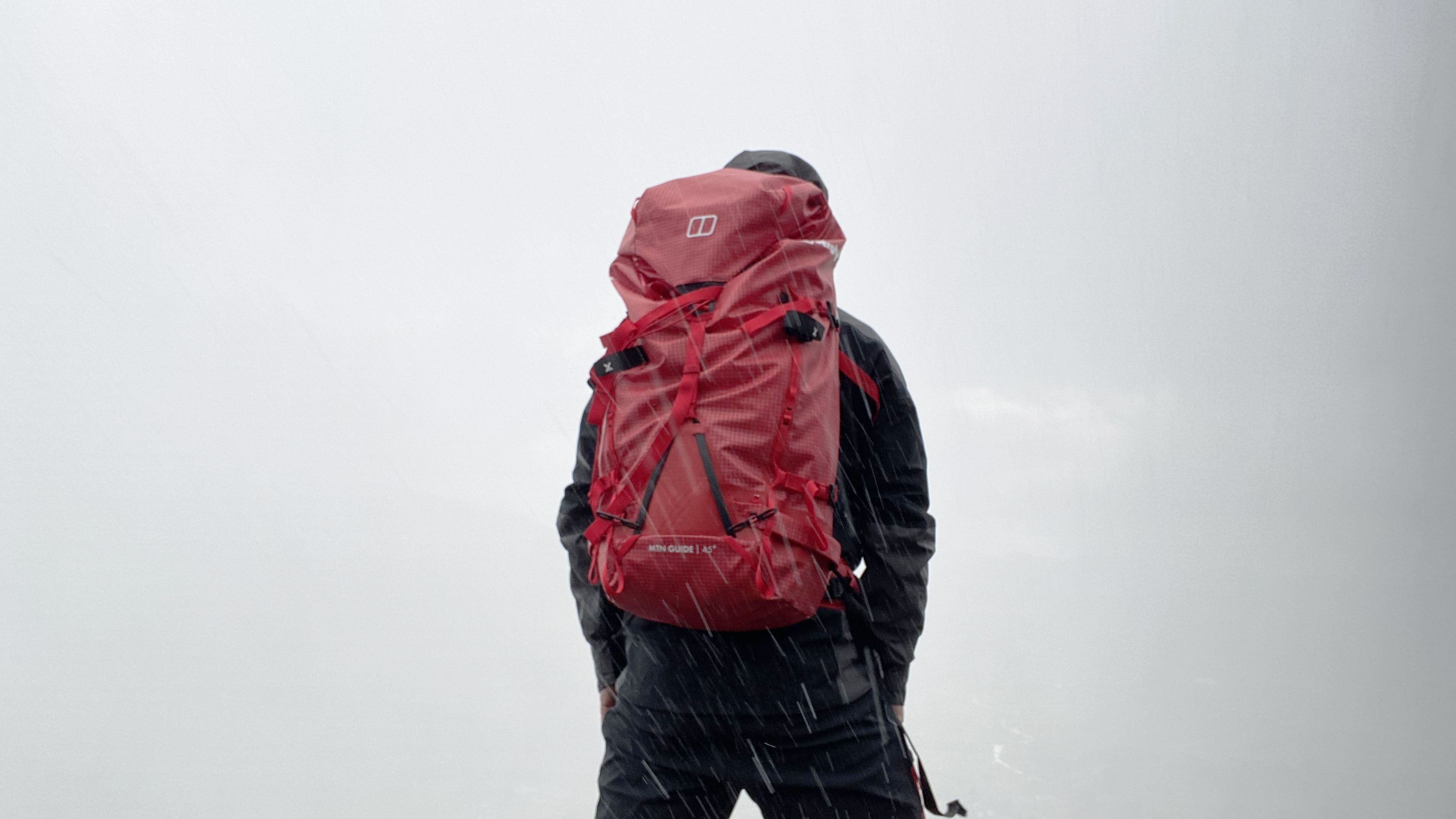
Customizable features
Many of the pack’s features are obviously designed for mountaineers rather than hikers and offer loads of versatility in terms of how you set it up. Some of these features are useful for adventurous hikers too, while others will only benefit climbers and the like. For example, there’s a dedicated rope lashing system that holds a climbing rope in place while still giving the wearer access to the top of the pack.
There are two ice axe attachment points, with standard webbing or aluminium toggles to choose from, depending on the type of tool. An extra-durable TPU panel protects the bag’s fabric from the teeth of the axes’ picks. There are plenty of ways to attach trekking poles or similar to the exterior of the pack too.
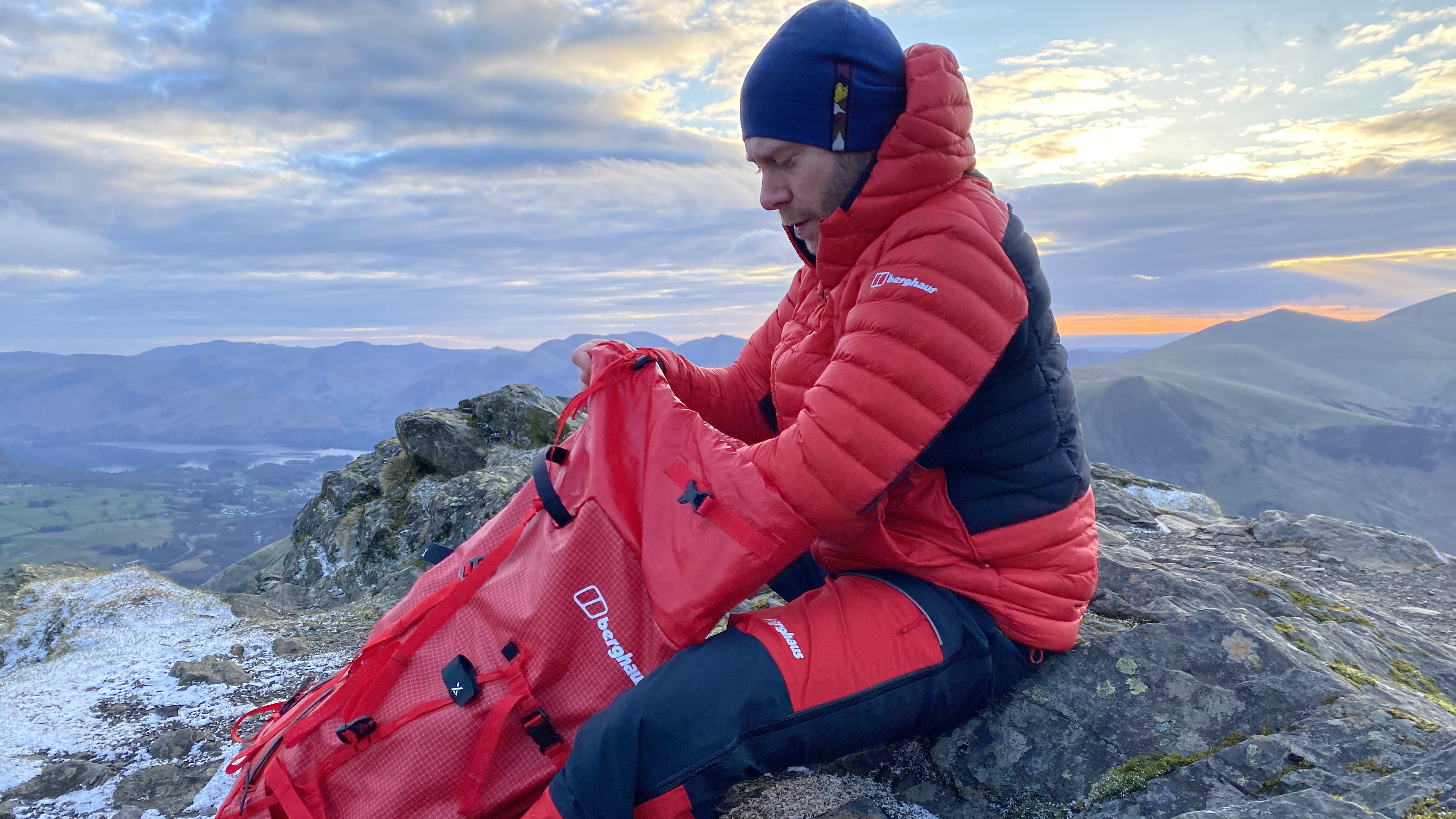
Yet another thoughtful feature for climbers and mountaineers is the mesh helmet holder, which attaches to the front of the pack. This means your helmet doesn’t take up any precious space, while the mesh holder stashes away into the lid when not in use.
Much of the pack’s features are removable, such as the side buckles, Velcro tabs, the lid and the hipbelt. This kind of customization is very welcome, allowing a minimalist and more lightweight approach when necessary and an all-bells-and-whistles approach when you’re faced with K2… or something slightly less daunting.
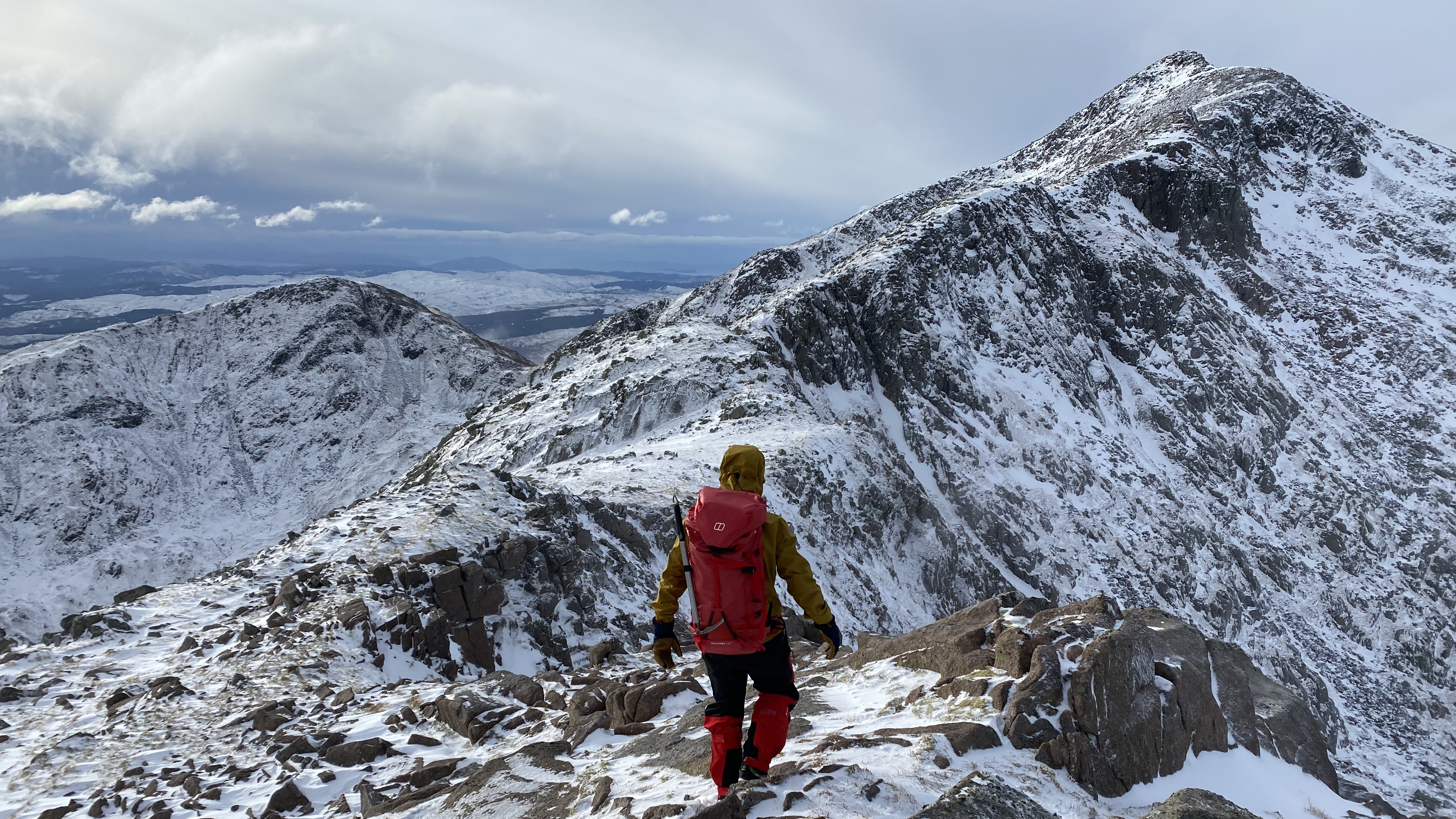
Other features
One of the standout features of the Guide 45+ is the zippered back panel, which allows you to access kit from the main compartment via the back of the pack or from the drawcord closure at the top. This makes getting organised before a day in the mountains much easier and saves having to rummage through everything to find that key bit of kit.
Rather than the usual zippered pockets found on a hiker’s pack, here you’ve got gear loops for climbing equipment. This allows fast and light alpinists to carry at least some protection on days where a full climbing harness would be overkill.
Specially reinforced grab handles are obviously designed for no-nonsense handling while wearing hiking gloves. Or, it’d be easy to imagine big wall climbers clipping a carabiner into these particularly meaty loops to haul the pack up to a portaledge or something equally vertigo inducing.
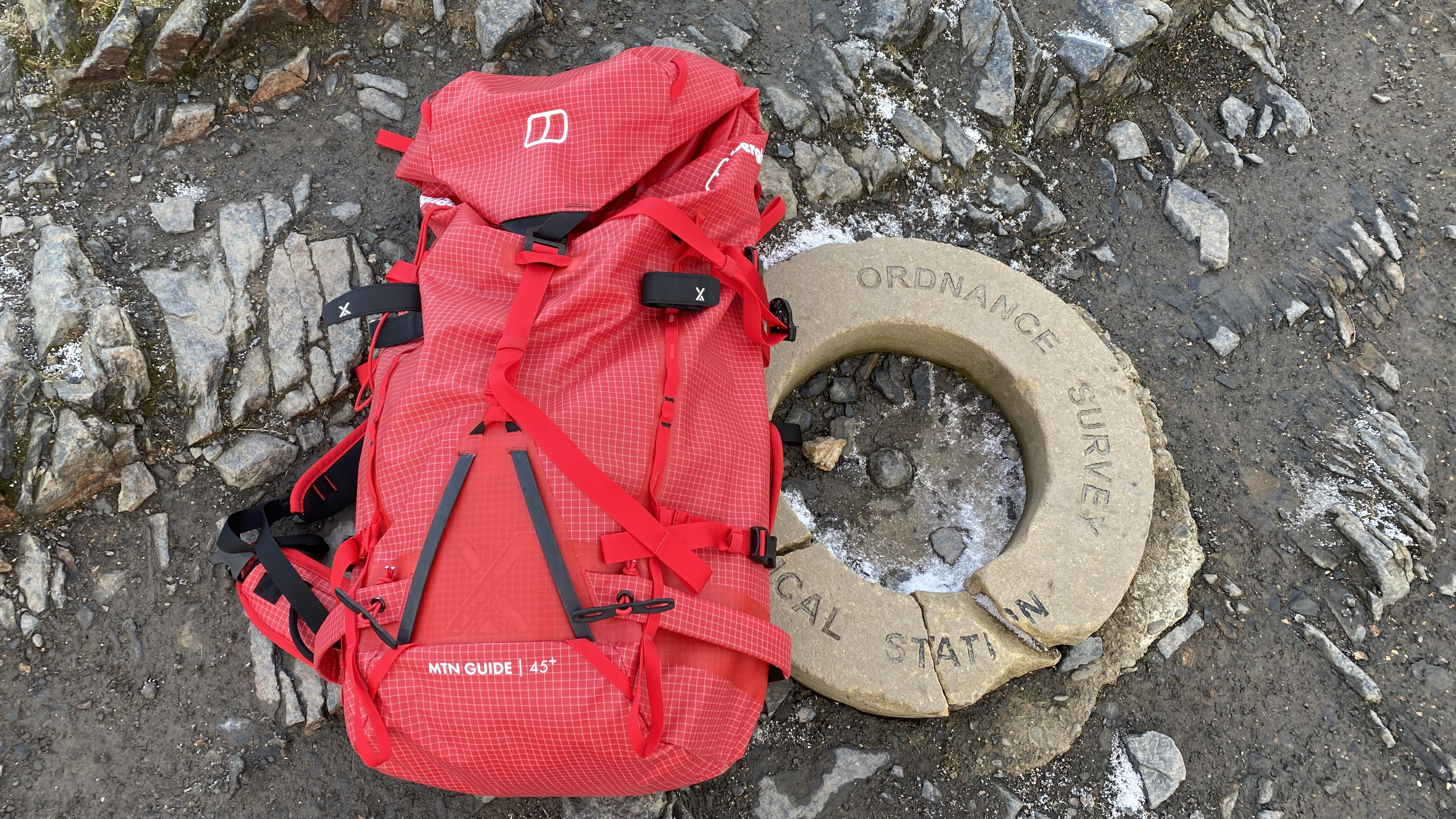
The padded back panel is obviously not as ventilated as a hiker’s pack, such as the suspended panels seen on products like Osprey’s Levity 45. However, when you consider that this is a pack that will usually be shouldered in freezing conditions and with the wearer sporting multiple mid layers and a hardshell outer – such as the matching Berghaus MTN Guide GTX Pro Jacket – a mesh panel wouldn’t do much anyway.
Other features include an internal hydration bladder sleeve, which can hold a reservoir of up to 3 liters. Just like the Osprey Mutant 52, the chest clip features an integrated whistle for seeking attention in an emergency.
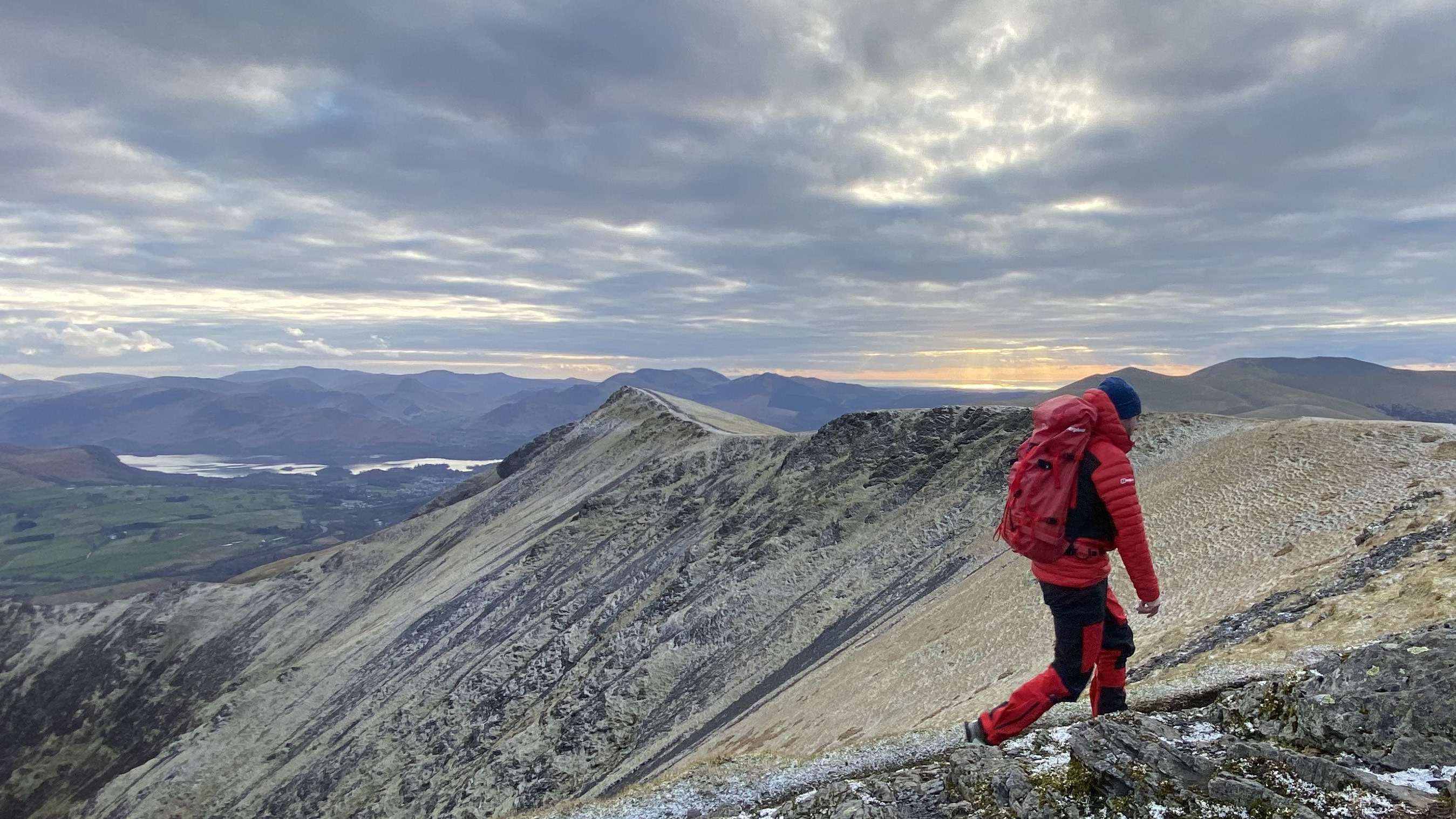
Speaking of emergencies… within the main compartment is a small, zippered pouch for valuables. Emblazoned across the pouch in reflective text and icons are emergency guidelines. Present are the mountain distress signal, how to signal a rescue helicopter and the emergency phone numbers for the UK, Europe, US, New Zealand and Australia. A neat little feature, albeit one that I’d hope never to use.
In the mountains
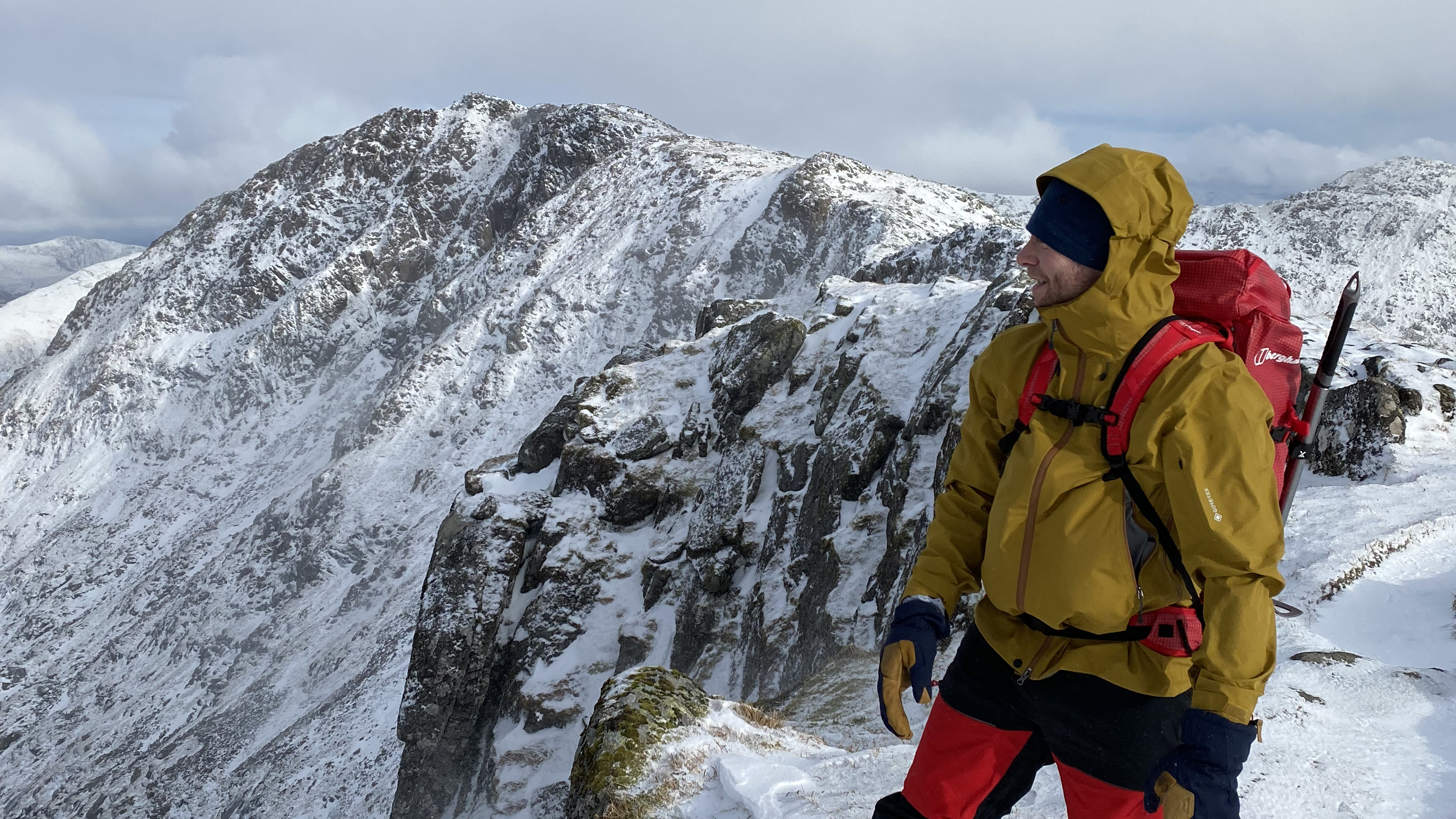
As a keen low-grade mountaineer, I found the MTN Guide 45+ to be a hugely versatile backpack. Whether I was heading to a crag for a spot of single pitch trad climbing, scrambling in the fells or heading somewhere snowy, the ability to adapt and remove the pack's various fixtures depending on what I was doing was a real boon.
I found that it was most in its element on winter mountaineering days, when it's features really shone through. The hugely robust face fabrics were a great protective shield for my internal gear, even in some pretty atrocious conditions. I liked having the option of the helmet attachment for the walk ins and walk outs too.
My main qualm with it is that adjusting the tightness of the hipbelt isn't as easy or as intuitive as it could be, especially when you're midway up a tricky route, you've tied off the strap's slack and you're wearing thick gloves.
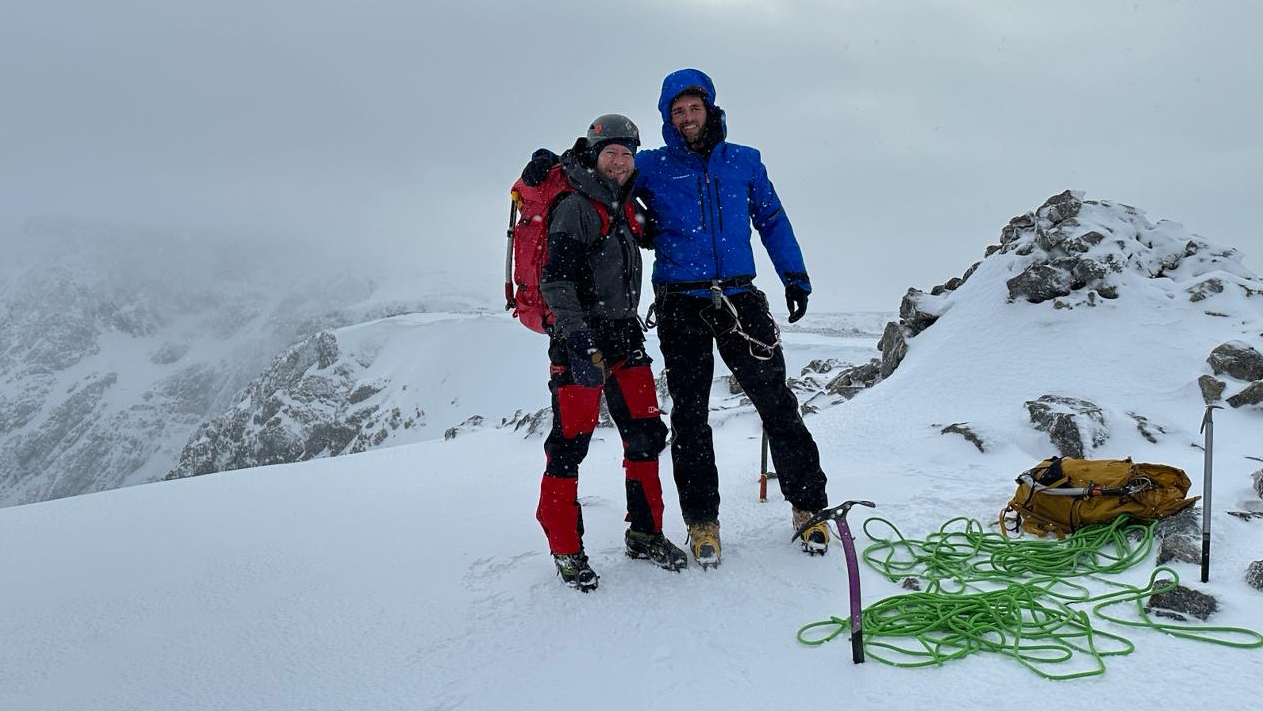
I spent quite a bit of time hiking in the Lake District during the test period and found the pack to be a good option, particularly while temperatures and conditions were still fairly wintry. It’s true that storage options are a little thin on the ground, as there are no exterior mesh pockets or hipbelt pockets. However, with the internal storage pouch and the lid compartment – plus a pair of hiking pants with a few zippered pockets – I had all the handy storage I really needed. For example, the matching MTN Guide GTX Pro Pants feature large zippered pockets.
I'd say that its decent capacity and weather-resistant qualities make it a solid option for wild camping expeditions in questionable weather. That all said, it’s definitely overkill for longer hiking routes in summer, when I’d want something that was both lighter and with a ventilated back system. However, if I was just heading out on a short walk to a climbing crag, it still ticks all the boxes.
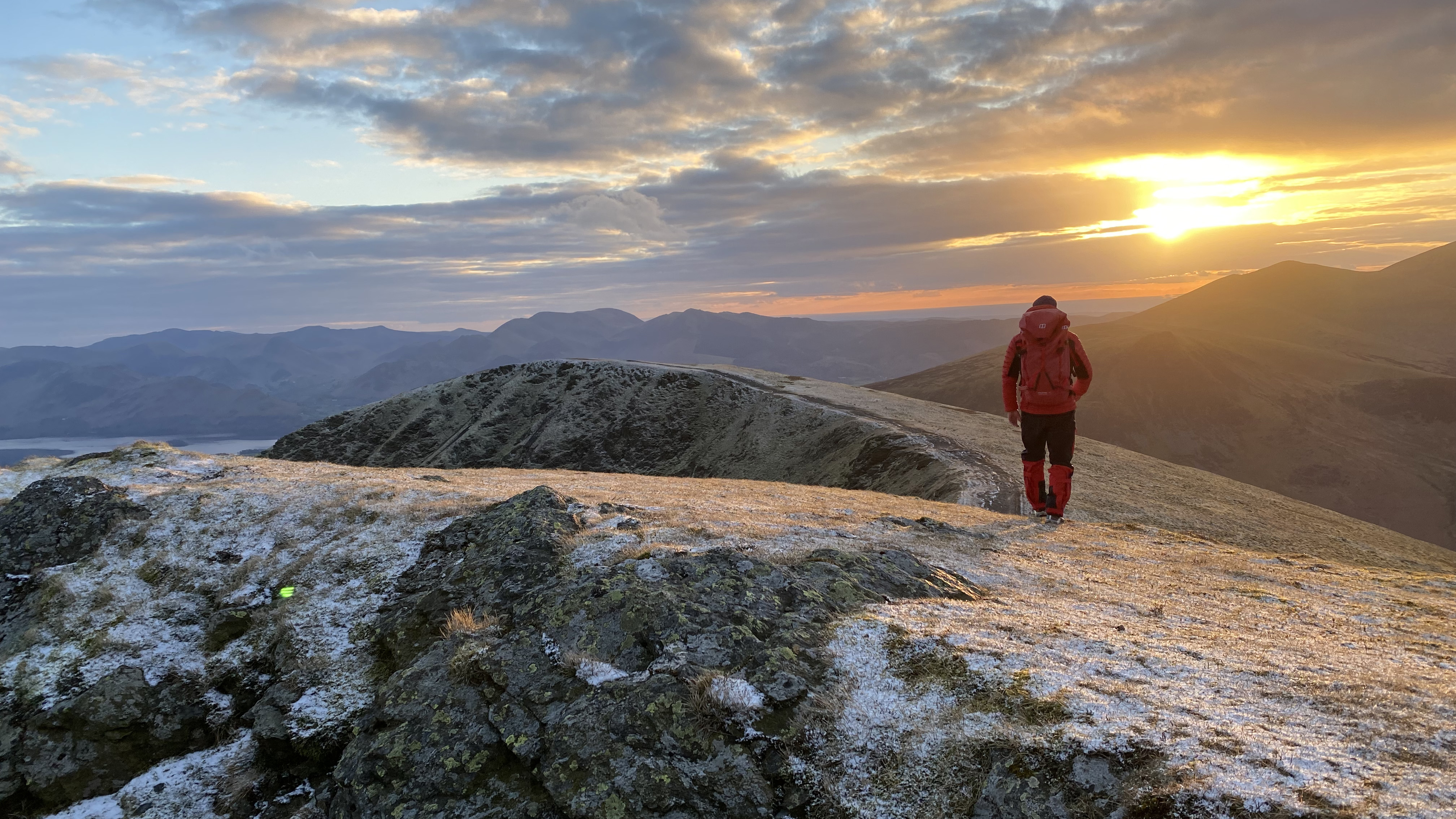
To summarise, the MTN Guide 45+ is obviously aimed at serious mountaineers and climbers and will suit their requirements very well. If you’re just getting into climbing and/or winter walking, it’s also a great option. On the summer hiking trails, it’s a bit of a fish out of water, as it hasn’t evolved for this scenario. So, if you’re a warm weather hiker, look elsewhere.
Alex is a freelance adventure writer and mountain leader with an insatiable passion for the mountains. A Cumbrian born and bred, his native English Lake District has a special place in his heart, though he is at least equally happy in North Wales, the Scottish Highlands or the European Alps. Through his hiking, mountaineering, climbing and trail running adventures, Alex aims to inspire others to get outdoors. He's the former President of the London Mountaineering Club, is training to become a winter mountain leader, looking to finally finish bagging all the Wainwright fells of the Lake District and is always keen to head to the 4,000-meter peaks of the Alps. www.alexfoxfield.com
